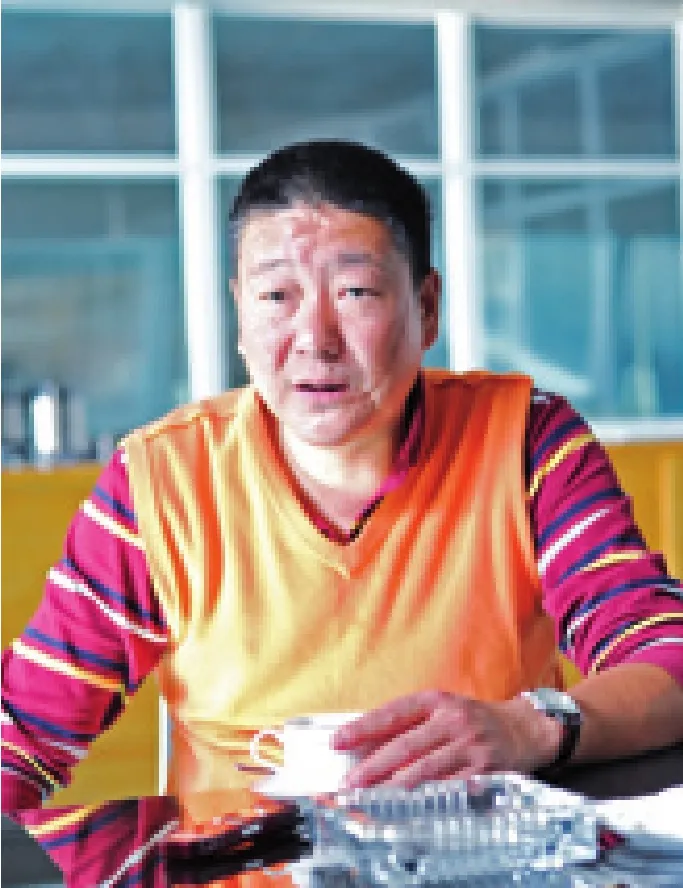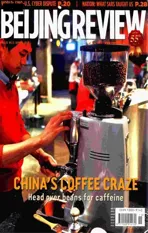A BIGGER pIECE OF THE BEAN
2013-12-06ByZhouXiaoyan
By Zhou Xiaoyan
Having worked for over 45 years in the industry, Jeremy Wakeford is widely recognized as a coffee-quality expert.In 2011, Starbucks sent him to China at a rate of $500 per hour to oversee quality control for Starbucks’ potential partner Aini Coffee, China’s biggest coffee bean processing and exporting company based in Pu’er, southwest China’s Yunnan Province.
Wakeford worked for half a year with Aini,observing plantation gardens and tasting different types of coffee that Pu’er, widely known for its variety of teas, offers. In January last year, Wakeford gave Aini’s coffee a score of 81.5, a mark reserved for coffee considered world class.
“If you put Manzhongtian coffee beans in an oak barrel, nobody can tell the difference from the blue mountain coffee in Jamaica. Manzhongtian is one of the few superb types of coffee I’ve ever tasted,” said the coffee master.
Following Wakeford’s run at Aini, Starbucks set up a joint venture with the company in February 2012 to purchase coffee beans from Pu’er coffee farmers to ship to the Seattlebased company for roasting.
“China is now a vital supplier of coffee beans to foreign companies” such as Starbucks and Switzerland-based Nestlé, Zhu Zhihong, head of Aini’s Pu’er factory, told Beijing Review.
Chinese consumers are addicted to foreign brands when it comes to coffee. What they may not know is that foreign brands often use Chinaproduced coffee beans, he said.
In recent years, more local farmers have turned to the more lucrative (although not always) coffee crop, which thrives in the mountainous areas of Yunnan.
“Coffee planting has become one of the pillar industries in Pu’er,” said Peng Yuanguo, vice Mayor of Pu’er, a remote southwestern city near the borders of Laos and Myanmar named after one of China’s most famous teas.
According to the Coffee Association of Yunnan, the province produced 65,000 tons of coffee in 2012, 98 percent of the total in China.
Pu’er alone produced 36,500 tons of coffee beans in 2012, more than half of Yunnan’s total output, according to Peng.
In the next five to 10 years, the Pu’er Municipal Government plans to expand its coffee plantation area to over 1 million mu (66,667 hectares), with a market value of over 10 billion yuan ($1.61 billion).Five years from now, over 100,000 jobs will be related to the coffee sector, said the city’s former mayor Li Xiaoping.
In January 2013, Pu’er was given the title of Coffee Capital of China by the China Fruit Marketing Association.
An upbeat trend
The enthusiasm of local coffee producer is spurred by China’s growing caffeine addiction.
The value of coffee sales in China increased by 20 percent in 2011 from a year earlier, reaching 6.25 billion yuan ($995 million), according to the market research firm Euromonitor International.
The alluring and more-promising-thananywhere-else market has attracted Western coffee chains.
Starbucks was one of the first to seize the opportunity by opening its first Chinese mainland store in Beijing in 1999. The company—with 18,000 outlets in 62 countries and regions around the world—now has more than 800 stores in 58 cities on the Chinese mainland, and it aims to have more than 1,500 stores in 70 cities by 2015.

A JOINT VENTURE: A truck is parked in front of the Starbucks Aini Coffee production unit, a joint venture set up to purchase coffee beans grown by local Pu’er farmers

Zhu Zhihong
The Chinese mainland now ranks as Starbuck’s fourth largest market. The company had nearly 12,000 outlets in the United States, 1,175 in Canada and 975 in Japan by the end of 2012.
Announcing the company’s record revenue for 2012 of $13.3 billion on March 20, Starbucks CEO Howard Schultz said the company has achieved stunning success in China.
“It’s no doubt that one day China will become our second largest market after the United States and it’s possible that, over many years, potentially the largest one,” he told China Daily.
Apart from Starbucks, other players are trying to wrestle their way in this big market. British company Costa Coffee plans to have 500 cafés in the country by 2016, while Hong Kong-based chain Pacific Coffee Co. said that its aim is to overtake Starbucks in China.
Instant coffee, which is abhorred by some Westerners, is more accepted by the Chinese for its convenience and ease of use, and has become a boon for Nestlé, the world’s largest food company by revenue and a major instant coffee producer.
China is now the fifth biggest global coffee market for Nestlé measured by sales. The Switzerland-based company said it expects the tea-drinking country to become its biggest market by 2020. Nestlé’s Nescafé brand has captured more than two thirds of the Chinese market, thanks in part to its instant coffee blends of powdered creamer and sugar.
Nestlé China’s food and beverage sales have risen by a compound annual growth rate of 16 percent since 2008, and coffee sales have grown faster than that, says Roland Decorvet, head of Nestlé China. With China’s per-capita coffee consumption only four cups per year compared with 400 in Japan, the potential is obvious, he says.
China’s coffee consumption totaled 120,000 tons in 2011, a mere 6 percent of that of the United States. Analysts from Barclays expect the country’s coffee demand to grow nearly 40 percent every year until 2015, according to a report from the Los Angeles Times.
Moving on up?
Domestic companies and Chinese farmers are benefiting from this growing trend by supplying coffee beans, but they are hardly satis fied with relatively lower pro fit margins and are struggling to move up the industrial chain.
With 20 years of experience in China’s coffee sector, Aini has now expanded its operations,running the gamut from coffee plantations, to processing, to brand marketing, to its first coffee“experience store.”
Aini has an annual production output of 15,000 tons and a plantation area of 9,070 mu (604.67 hectares), where 33 types of coffee are cultivated. The company plans to invest another 1 billion yuan ($161 million)and expand its annual production to 5 billion yuan ($805 million) by the end of 2015.
“We just bought the highest-quality Germanmade coffee processing machine, which will help enlarge our capacity in down-stream processing,”said Zhu, the Aini factory head.
The company plans to produce 3,000 tons of roasted coffee beans, 5,000 tons of roasted coffee powder and 20,000 cans of bottled coffee each year, he said.
“Enhancing brand recognition is a big issue for the company,” Zhu said. “When it comes to coffee, homegrown brands might hit a few rough patches if they want to be recognized by Chinese people.”
“We opened an online shop to sell coffee beans, which proved to be a huge success. Also,Aini will invest more in branding,” Zhu said, adding that the partnership with Starbucks provides a significant boost for the Aini name.
At the end of 2012, Aini Coffee established its first coffee “experience store” in tiny Pu’er Simao Airport, marking the company’s formal entry into the Chinese coffee retail market and placing it in potential competition with Starbucks, which is also fighting Costa Coffee in airport retail space.The store, Aini says, isn’t meant to be a full-fledged coffee shop—at least not yet—but an outlet to sample the company’s various coffee-based beverages.
“We don’t expect the coffee stall in the airport to be profitable in the short term. It is a pilot run for our future expansion,” said Zhu. ■
